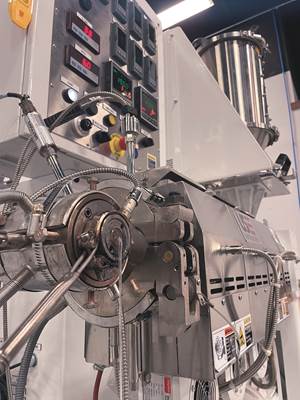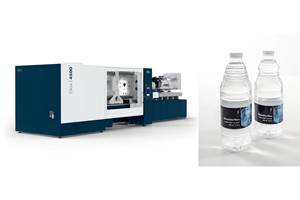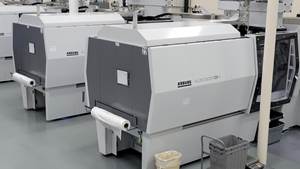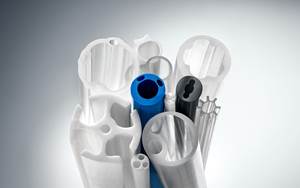PMC Proves It’s Not Too Late To Pioneer in Medical Molding
Processor Strategies: PMC Medical
Molding medical devices is a high-end business that has proven more resistant to economic swings and to foreign competition than some other plastics markets.
Molding medical devices is a high-end business that has proven more resistant to economic swings and to foreign competition than some other plastics markets. On the other hand, there are significant barriers to entry: challenging technical and regulatory standards, highly demanding customers, and a host of well-established competitors. But that’s not enough to discourage all newcomers. Coming from a base in automotive and electronics, PMC, LLC decided to break into medical molding four years ago. It aimed straight for the most exclusive sector—long-term surgical implants. Taking a fresh look at how things are done in this field, PMC pursued innovative technology overlooked by competitors. This technology promises both cost and quality advantages, living up to PMC’s motto: “Smart Solutions.”
PMC (pmcsmartsolutions.com) has been family owned and operated since it was founded in 1929. The headquarters office in Cincinnati was formerly a molding plant dedicated to thermoset brake boosters. Today the company focuses on engineering thermoplastics and has around 200 employees and a 70,000-ft2 plant in Shelbyville, Ind., with 40 injection presses of up to 400 tons. It also has a joint-venture plant in Mexico.
In 2007, PMC decided to go after surgical devices and implants for orthopedic, spine, cardiology, and other uses. PMC invested over $2 million in two years to build a Class 100,000 clean room at Shelbyville and install three all-electric presses—two Fanuc Roboshot machines of 33 and 110 tons and a 75-ton Nissei with a vertical clamp. The new PMC Medical division achieved registration to the ISO 13485:2003 medical quality system in late 2008.
A BETTER WAY TO HEAT MOLDS
For making auto parts of PPS, PPA, PEI and other high-temperature resins, PMC uses hot-oil to control its mold temperature. But oil is not desirable for a clean room, so PMC, like all other U.S. medical molders, uses electric cartridge heaters in molds for its PEEK surgical implants, which require temperatures around 400 F. Zoned heating with electrical heaters requires expensive controls on each mold, says Robert Langlois, PMC’s executive director of technology. What’s more, cartridge heaters tend to burn out and thermocouples fail on a regular basis. More important, says Langlois, cartridge heaters tend to have hot and cold spots along their length. And they have no means of removing heat, so cycle times for larger PEEK medical components tend to be fairly long—up to 15 min.
Last year, Langlois contacted a Single Temperature Controls, Charlotte, N.C. (single-temp.com), to find out more about its high-temperature, pressurized-water mold-temperature-control units (TCUs). Langlois found Single to be the only source of hot-water TCUs capable of PEEK’s 400 F mold temperature.
Like hot oil, pressurized hot water requires no mold thermocouples and it adds or removes heat as needed. However, the idea of high-pressure hot water scares some people. But Langlois notes that steam escaping from a pinhole leak dissipates so quickly that it’s harmless just 6 in. away.
Langlois ran a head-to-head comparison of hot-water and electrical heating with a test mold for PEEK plaques. He found that hot water reduced shot-to-shot mold-temperature variation by 75%. More important, Langlois said hot-water heating reduced temperature variances along the length of the 5-in. plaque by almost 90%, from 44.2° F with electric heat to 5° F with hot water. That decreased dimensional variation along the part by 50%. Lab analysis confirmed that the larger mold-temperature differentials produced variations in crystallinity along the part, resulting in shrinkage differences and molded-in stresses. (Click here to see the full report on these experiments.)
Langlois hopes hot-water heating can cut cycle times for large PEEK parts from 15 min down to 3 min. He also expects lower tool maintenance costs and simpler setup than with electric heaters.
Related Content
Catheter Specialist Finds Sweet Spot Serving Small, Medium-Sized Concerns
Medical-component specialist LightningCath has carved a niche meeting the needs of small to medium-sized entrepreneurs with complex catheter designs … quickly.
Read MoreKrones Acquires Netstal
Krones adds PET preform injection molding to its bottle blowing and filling capabilities, as well as cap molding and expansion into medical, food and other markets.
Read MoreConsistent Shots for Consistent Shots
An integral supplier in the effort to fast-track COVID-19 vaccine deployment, Retractable Technologies turned to Arburg and its PressurePilot technology to help deliver more than 500 million syringes during the pandemic.
Read MoreMedical Manufacturer Innovates with Additive Manufacturing and Extrusion Technology Hubs
Spectrum Plastics Group offers customers two technology hubs — one for extrusion, the other for additive manufacturing — to help bring ground-breaking products to market faster.
Read MoreRead Next
Beyond Prototypes: 8 Ways the Plastics Industry Is Using 3D Printing
Plastics processors are finding applications for 3D printing around the plant and across the supply chain. Here are 8 examples to look for at NPE2024.
Read MoreSee Recyclers Close the Loop on Trade Show Production Scrap at NPE2024
A collaboration between show organizer PLASTICS, recycler CPR and size reduction experts WEIMA and Conair recovered and recycled all production scrap at NPE2024.
Read MoreLead the Conversation, Change the Conversation
Coverage of single-use plastics can be both misleading and demoralizing. Here are 10 tips for changing the perception of the plastics industry at your company and in your community.
Read More






















